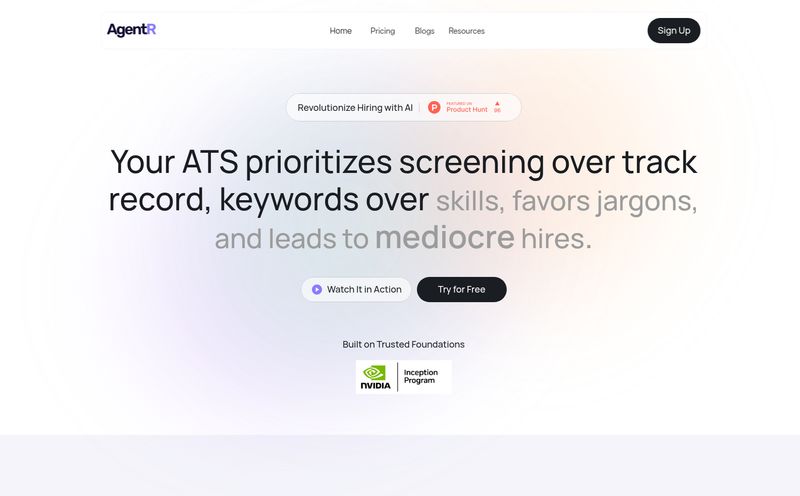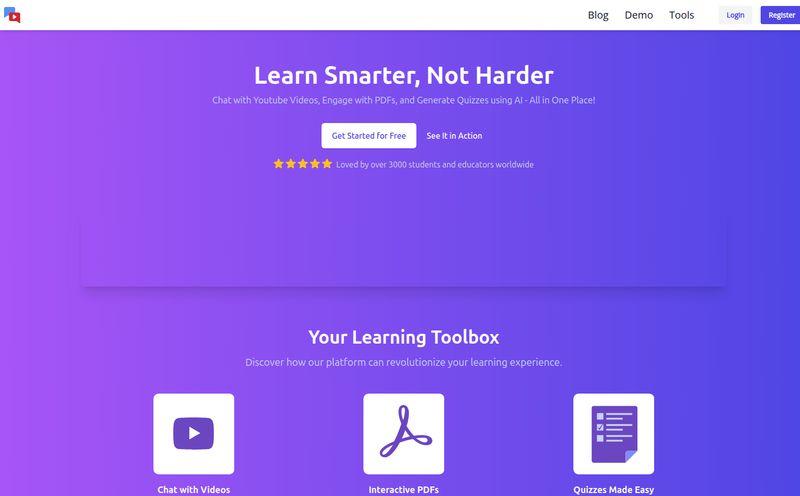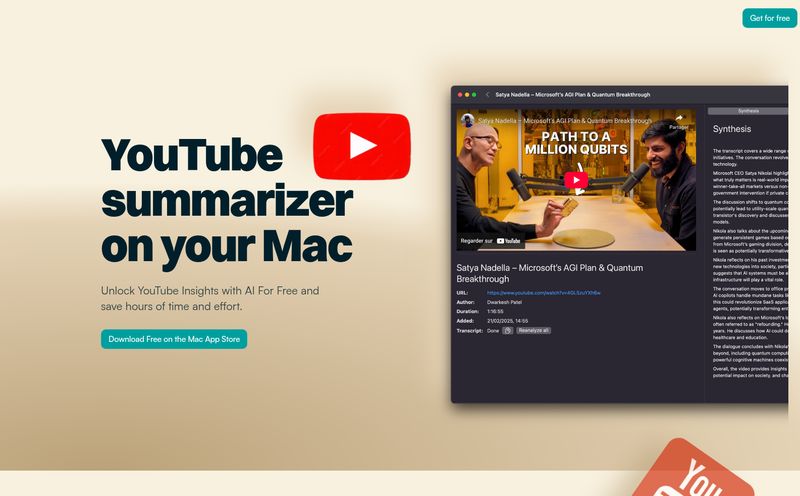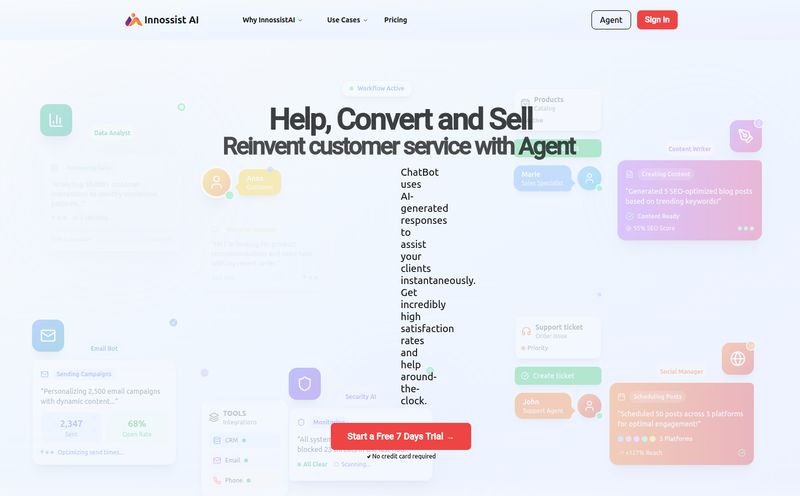If you’re in HR or a hiring manager, your screen is probably littered with more tabs than you can count. One for your Applicant Tracking System (ATS), one for LinkedIn, three for scheduling, and about a dozen for the actual resumes you’re supposed to be reading. It's a grind. We’ve all been there, staring at a mountain of applications, feeling like you’re panning for gold in a river of buzzwords. You spend hours, days, just on first-round screenings, hoping to find a few promising nuggets.
It’s exhausting. And honestly, it’s not always the best use of our skills.
So, when I first heard about RightMatch AI and its bold claim of automating first-round interviews, my inner skeptic raised an eyebrow. Another AI tool promising to solve all our problems? Sure. But the more I looked into it, the more I realized this might be different. This isn't just about keyword matching; it’s about fundamentally changing that initial, time-sucking stage of hiring. So I decided to give it a proper look.
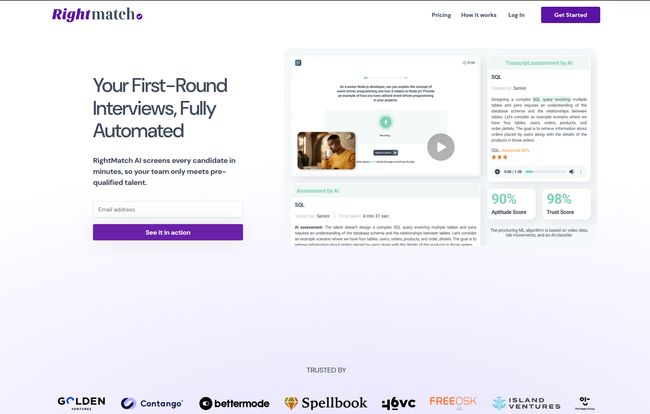
Visit RightMatch AI
So, What Exactly is RightMatch AI?
At its core, RightMatch AI is an AI-driven platform designed to take over the heavy lifting of the initial screening process. Think of it as your super-efficient, always-on, unbiased recruiting assistant. Instead of you or your team conducting dozens of 15-30 minute introductory calls, you set up a structured interview on the platform. Candidates then record their answers on their own time, using their webcam and microphone.
The real magic happens next. The AI doesn’t just transcribe the video; it analyzes the content, the sentiment, and the candidate’s responses against the criteria you’ve set. It gives you a summarized, data-backed report on each person. The goal? To get you to the best-fit candidates faster, without the soul-crushing administrative work.
The 3-Step Process That Actually Makes Sense
One thing I appreciate is the simplicity. They’ve boiled the process down to three main stages, which feels manageable even for teams that aren't super tech-savvy.
Step 1: Building Your AI Interviewer
First, you create the interview. This is the setup phase, and it’s pretty crucial. You can tailor the questions to the specific role, your company culture, and the core competencies you're looking for. It’s not just a generic template. You’re essentially programming your AI assistant to ask the things you would ask in a first-round call. This part requires some thought, but doing it once saves you from repeating yourself on call after call.
Step 2: The Candidate Experience
Once you send out the link, candidates can record their interview whenever it suits them. This is a huge plus. No more scheduling nightmares across time zones. They get the questions, think for a moment, and record their answers. It's a more flexible and, for many, less intimidating process than a live video call. Plus, RightMatch AI says it provides actionable insights back to the candidates, which is a fantastic touch that most application processes completely lack.
Step 3: The AI-Powered Debrief
This is where you get your time back. Instead of re-watching hours of video, you get a dashboard. You see transcripts, AI-generated summaries, and scores for things like aptitude and personality. The platform highlights key moments and gives you an at-a-glance view of who’s a strong match and why. You can quickly compare candidates side-by-side based on consistent data, not just on who had the most coffee that morning. From there, you can share the top profiles with the rest of the hiring team.
The Features That Genuinely Impress
Okay, let's get into the nitty-gritty. A few features really stood out to me as more than just bells and whistles.
AI Analysis That Goes Beyond Keywords
This isn't your old-school ATS that just scans for "Project Management" or "Java." The AI here seems to be doing some form of sentiment and contextual analysis. It’s trying to understand how a person answers, not just what they say. The dashboard in the screenshots shows a 98% "Aptitude Score" and a 98% "Personality Score" for a candidate named "Jacy Hocks." While I'm always a bit wary of putting a number on personality, having a consistent metric is a powerful starting point for discussion. It’s a tool to guide your intuition, not replace it.
Seamless Integrations are a Must
A new tool that doesn’t play well with others is a non-starter. Period. The team behind RightMatch AI clearly gets this. The website shows logos for integrations with major platforms like Greenhouse, Workday, Lever, Teamtailor, and even communication tools like Slack and Teams. This is massive. It means you can slot it into your existing workflow without creating a new, isolated data silo. Your hiring process becomes a smooth-flowing river, not a series of disconnected ponds.
Promoting Unbiased Hiring, For Real
The industry has been talking about diversity and unbiased hiring for years, but it's hard to implement. We all have unconscious biases. A tool like this helps mitigate that. By having an AI conduct the first screening based on pre-defined, job-related criteria, you remove the initial human subjectivity. It doesn't matter what a person looks like, where they're from or what their name is. The AI evaluates them on the substance of their answers. This creates a more level playing field and, in theory, leads to a more diverse and qualified shortlist. A huge win in my book.
Does It Really Save 70% of Your Time?
The website makes a bold claim: "Save at least 70% of your time per hire." Can it deliver? Look, I haven’t run a formal time-and-motion study, but from my experience, I can absolutely see how. Think about the math. If you screen 50 candidates with a 20-minute call each, that’s over 16 hours of work. With RightMatch AI, you spend maybe an hour setting up the interview. Then, you spend perhaps 2-3 hours reviewing the AI-shortlisted top 10 candidates in detail. The time savings are obvious and honestly, they might even be conservative with that 70% figure for high-volume roles.
"By automating the initial screening, you’re not just saving time; you’re reallocating your most valuable resource—your expertise—to the candidates who truly deserve it."
So, What's the Catch? A Realistic Look
No tool is perfect, and it’s important to be realistic. This isn't a 'set it and forget it' magic box. The quality of the output depends entirely on the quality of the input. If you write bad interview questions, you'll get poor results. There’s an initial setup and learning curve. Also, while the AI is powerful, it could potentially overlook certain nuances—a brilliant but nervous candidate, for instance. I see RightMatch AI as a powerful filter, not the final judge. You still need that human evaluation for the final stages. You have to supplement its findings with your own seasoned gut feeling during the live interviews.
RightMatch AI Pricing: What to Expect
And now for the question everyone asks: how much does it cost? As of writing this, RightMatch AI doesn't list its pricing publicly on the site. This is pretty standard for B2B SaaS platforms in the HR space, as pricing often depends on company size, hiring volume and the specific features you need. Your best bet is to Book a Free Demo through their website. They’ll likely walk you through the platform and create a custom quote based on your needs. Don't let the lack of a price tag scare you off; it usually just means they want to talk to you first to make sure it's a good fit.
Frequently Asked Questions about RightMatch AI
- Is RightMatch AI difficult to set up?
- Based on the 3-step process, the initial setup seems straightforward. The main work is in crafting good interview questions. With integrations to existing ATS platforms, it should fit into most modern HR tech stacks without a major headache.
- Can the AI completely replace human recruiters?
- Absolutely not. It's designed to augment, not replace. It handles the repetitive top-of-funnel screening, freeing up human recruiters to focus on building relationships with the best candidates, conducting in-depth interviews, and making the final hiring decision.
- How does the AI ensure fairness and avoid bias?
- The system focuses on standardized questions and job-relevant criteria. By removing demographic and personal presentation factors from the initial screen, it bases its evaluation on the content of a candidate's answers, creating a more objective and consistent process for everyone.
- What kind of roles is this best for?
- While it could be adapted for many roles, it seems especially powerful for high-volume positions where you get hundreds of applicants, such as customer service, sales development, or entry-level tech roles. It streamlines the process when you simply don't have time to talk to everyone.
- Do candidates find the experience of talking to an AI weird?
- Younger generations are increasingly comfortable with digital interactions. The flexibility of recording on their own schedule is a major benefit that often outweighs the lack of a live person on the other end for a brief, initial screening.
My Final Verdict: Is RightMatch AI the Real Deal?
After digging in, I'm genuinely optimistic. The world of traffic generation and SEO is all about optimizing funnels, and that's exactly what RightMatch AI does for the hiring funnel. It takes the widest, leakiest part of the process and makes it efficient and data-driven.
It’s not a silver bullet that will hire the perfect person for you with the click of a button. You still need your human expertise. But it is a powerful ally. It’s a tool that clears the noise, fights bias, and gives you back your most precious commodity: time. Time to focus on the people, not the paperwork. And in the world of recruiting, that’s a game-changer. If you’re drowning in applications, I'd say booking a demo is a no-brainer.
